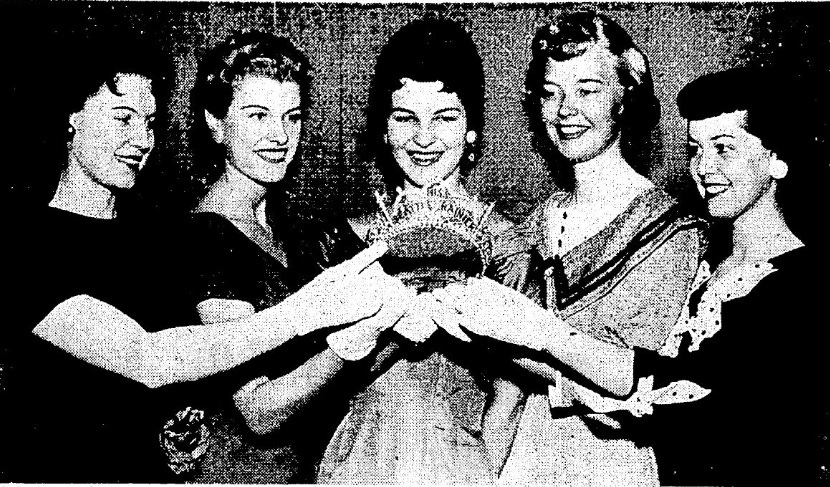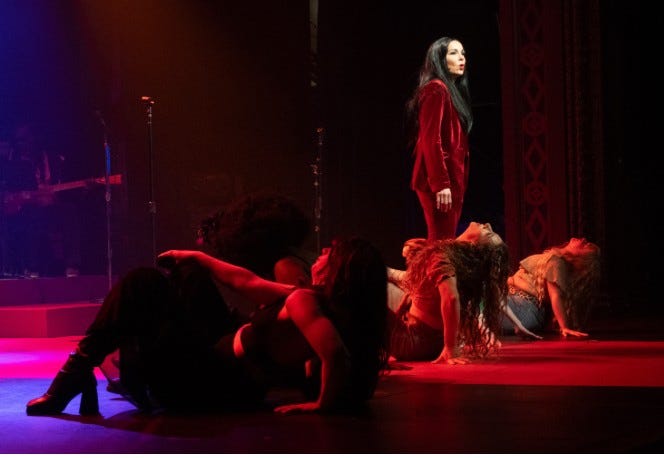In 1998, an undercover detective paid a visit to a fancy, split-level house in an affluent Eastside neighborhood. Posing as a john, the plainclothes officer was responding to a newspaper ad which promised “sensual massages.” During the visit, he was able to meet the owner of Karen’s Personal Services who ran the service from her luxurious Kenmore home along with a staff of young female “masseuses.” The owner - a confident and attractive older woman in her 60s - gave a quick tour of the place while gently yet methodically interrogating the man with a series of questions to suss out if he was a cop or not. At one point she even fondled him as though to quickly gauge his reaction. When he apparently passed all her tests, she brought him downstairs to meet the girls.
Several months later, the same detective would make a second visit to the home. Only this time, after the owner warmly greeted him at the door, he would flash his police badge and slap a pair of handcuffs on her. The next day, the story of her arrest would dominate the local news. Older residents would recognize the lady as a one-time beauty queen who had previously won the Miss Washington USA pageant, but to those in law enforcement she was better known as longtime madam, Rose Marie Williams.
(Rose Marie Williams - pictured in the middle - admiring the Miss USA crown with other contestants, circa 1958)
The story of Rose Marie Williams recalls other notable madams from the local area, ranging from Mary Ann Conklin and Lou Graham, who ran some Seattle earliest brothels, to the more contemporary story of Nellie Curtis who ran the famous LaSalle Hotel - a large bordello near the Pike Place Market. Like her predecessors, Williams was a spitfire entrepreneur who earned her riches by providing high-profile Seattle businessmen with female companionship.
Unlike the other madams, most of whom settled here from other parts of the country, Williams was a Seattle native. Born here in 1939, she attended Franklin High School and later the University of Washington. She was known for her vivacious beauty and piercing blue eyes, which made her a natural candidate for local beauty pageants. In 1956, she was crowned as Pow Wow Queen during the Seafair festivities that year; and in 1958 she won the title of Miss Washington USA where she went on to represent Washington state in the Miss USA pageant. Eight years later, she would be arrested for prostitution.
What happened between her time as a beauty queen and a call girl remains unknown, but her arrest in 1966 would kick off a legacy as one of Seattle’s most prolific madams.
In 1971, Williams made newspaper headlines when she was convicted of running an escort business. In an early example of her savviness, Williams kept herself out of jail by threatening to release the names in her little black book which was rumored to include some of Seattle’s leading judges, politicians, and corporate execs. She pleaded guilty and was sentenced to three years’ probation by a judge who miraculously declared her to be “rehabilitated.”
Williams would show up next in 1981, when she was arrested with a small, organized crime ring at the Peace Arch border crossing in Blaine, Washington by U.S. Customs agents. Williams and her cohorts were found with $10,000 of stolen clothing and arrested on charges of smuggling and criminal trafficking.
Afterwards, Williams managed to keep herself off the public radar but had not exactly abandoned her criminal lifestyle. At some point during the ‘80s, she resumed her career as a madam in which she operated a brothel from her home in a well-to-do neighborhood in Kenmore. Known as Karen’s Personal Services, her business cards advertised “sensuous massages for men” and her clients mostly consisted of wealthy businessmen and executives. She also began operating out of a second residence on Woodland Park Avenue near Green Lake. The Seattle home caught the attention of neighbors when wrought-iron security bars were installed on all the doors and windows, as well as an array of security lights, with the address posted on both the front and back of the house in large numbers.
From her Kenmore residence, Williams would greet clients, collect a $200 hourly fee, then turn the client over to one of her female employees who would provide sex for an additional fee, which was always referred to as a "tip,” and then share the proceeds with Williams.
Part of Williams’ success for all these years was her sense of caution and vigilance. All her workers were taught to use code words such as “tea and crumpets” and “XYZ” to describe different sex acts. She also held regular training classes on how to spot undercover cops. When doing an “out-call” at a hotel, for example, she taught her girls how to check airline tickets, luggage tags, prescription bottles, and business cards to help satisfy that the customer was not a police officer or a “bad trick.” Her girls were also instructed to use certain lines of questioning regarding such things as marital status and employment to help weed out any suspected cops. In 1996, while detectives were staking out her house, they once spied nine women arriving at Williams' home for one of these training sessions.
Somewhat ironically, it was Williams’ own failed instincts which led to her arrest in 1998. The charges were money laundering and promoting prostitution. Afterwards, investigators discovered $97,000 in her bank account, $60,000 in hundred-dollar bills in a safe-deposit box, and a fancy Corvette in the garage of her expensive home, even though her income-tax returns reported less than $10,000 each year.
In the months leading up to her trial, Williams provided several interviews with the local press in which she very convincingly portrayed herself as the hapless victim of an unjust arrest. Some of her performances were worthy of an Academy Award. "I don't even know what money laundering is," said Williams in one interview, "I'm going to go to court and tell my side of it and hope the jury will believe me. I would never permit illegal activity in my home!" She clarified that all the money found in her bank account was simply an inheritance she had received from the estate of her deceased grandmother, and when asked about the steady stream of cars arriving and leaving her home with lone male occupants, Williams explained, “Those were my son’s teen friends visiting. Nothing else!”
In court, the conservatively dressed and bespectacled Williams looked very matronly and had little to say other than that she had been through a lot. It’s unknown if Williams was able to use her “black book” for any kind of legal leverage, but what is known is that in exchange for a guilty plea, the former Miss Washington was sentenced to 10 days behind bars, 50 days of home detention, and ordered to do 240 hours of community service. She has not been seen or heard from since.
_______________________________________
While the current whereabouts of Williams remain unknown, her spirit lives on and is currently being celebrated onstage in the cabaret and burlesque musical, “Seattle Vice ‘76: The Saga of Sin,” which is currently playing at The Triple Door through May 18th. I recently spoke to Opal Peachey who not only co-wrote and co-produced the show but also has a starring role as Rose Marie Williams herself.
Peachey and her creative partner, Mark Siano, previously explored this world in 2016’s award-winning cabaret musical, “Seattle Vice,” which explored the city’s seedier side during the 1960s. This is their follow-up, and like “Seattle Vice,” their current production is inspired by the late Rick Anderson’s gritty and groundbreaking book of the same name, diving even deeper into the scandalous and storied history of Seattle's underworld.
The following is an excerpt from our conversation:
-Hello Opal! Please tell me about your current show.
Opal: Hello Brad, it is wonderful to talk to you. This is a follow-up to our previous show, Seattle Vice, which was based on Rick Anderson’s book about the Seattle criminal world during the 1960s with the Colacurcio brothers, and all the crooked cops and politicians, and the “tolerance policy” that existed back then. Our current show explores that same world but takes place ten years later in the 1970s. And like our first show, this one also features go-go and burlesque dancing, as well as circus arts, and great music.
-I love that you are using Rick Anderson’s book as your main inspiration. He has been a huge inspiration to my own work as well. I understand that he actually attended your first show (Seattle Vice in 2016) just prior to his death.
Opal: Yes, I can see his influence in your work, especially your Substack. And yes, we worked with him while writing our first show and he was able to attend one which was playing at ACT Theater. He really loved it, which meant a lot to us. We also had members of the Colacurcio extended family attend one of our shows, and they also loved it, which was completely wild! We interviewed people who had worked at the various strip clubs owned by the Colacurcio’s, and some of them even showed up. Lots of great stories! One old guy I talked to brought up Rose Marie Williams and told me that she gave him the best blowjob of his life.
-(laughs) That’s hilarious! Have you spoken to Willams at all? Any idea what she is up to these days?
Opal: No, we haven’t talked to her.
-She has such a wild story, going from a beauty queen to a madam…
Opal: Yes, but both of them are similar in that a beauty queen is presenting a sexy version of themselves in order to win the pageant, and so going from that into sex work kind of makes a lot of sense.
-Good point! How has she inspired this show, especially with you playing her as a character?
Opal: For me, it’s about men having power over women, and I wanted to explore all sides of this. Especially with powerful women like Rose. I love the idea of her being a successful entrepreneur which happened to coincide at the same time as the Colacurcios and all their clubs, with both sides involved in the sex trade. To me, it’s interesting that Rose expanded into rich, residential neighborhoods, which was much more of a white-collar world; while the Colacurcios and their clubs were in more blue-collar locations and their customers were mostly working class.
-That is a really interesting point. I am super psyched that you are bringing this story to life and am really hoping to catch a performance.
Opal: Thank you! It’s tough for the arts these days and I think the messages we explore in the show are important, especially in today’s climate. So, I hope everyone has a chance to come see us.
(Opal Peachey channeling her inner Rose Marie Williams onstage)
“Seattle Vice ’76: The Saga of Sin” runs from now through May 18th at The Triple Door. Tickets are selling fast, so make sure and grab yours today!








Oh, this is fabulous. What a great story.